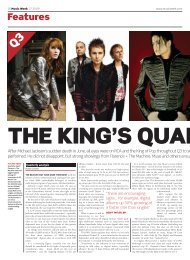Remake, Remodel: The Evolution Of The Record Label
Remake, Remodel: The Evolution Of The Record Label
Remake, Remodel: The Evolution Of The Record Label
Create successful ePaper yourself
Turn your PDF publications into a flip-book with our unique Google optimized e-Paper software.
This pre-draft version is strictly for review purposes only and is not for general dissemination or sharing.<br />
But Tim, David and EMI all agreed to explore a real joint venture – one in which both<br />
parties had a stake in ALL income streams, not just an agreement on recorded music.<br />
Tim Clark 18 comments, ‘We wanted to make sure this deal was a little more<br />
groundbreaking than simply trying to get as much money as possible and putting up with<br />
the record company owning all the recording rights and not being involved in anything<br />
else.’<br />
<strong>The</strong> contract gradually took shape over several months, and all major labels offered<br />
against the same basic structure – this drove out any complacency from EMI that the<br />
deal might automatically be theirs!<br />
But Robbie re-signed with EMI in a deal that was widely (and often inaccurately)<br />
publicised in the national and international press.<br />
<strong>The</strong> arrangement gave EMI a substantial minority share in the profits from all of Robbie<br />
Williams’ non-record income – including live, merchandise, sponsorship, publishing and<br />
so on. Sharing in these additional income streams enabled EMI to offer much larger up<br />
front money guarantees to Robbie than could ever be the case in a simple record deal. So<br />
he was effectively securitising the next few years of a portion of his income in return for<br />
up-front guarantees.<br />
EMI and Robbie formed a new company (called In Good Company) to manage these<br />
activities and income and I was EMI’s representative on the board.<br />
For the first time, we were able to sit with the artist managers and discuss Robbie’s<br />
plans across the whole gamut of his business, knowing that we had a stake in all of it.<br />
This gave the relationship a much clearer feeling of being one team, rather than artist<br />
and record company.<br />
As Tim Clark 19 says, ‘While the deal with EMI was not perfect in every respect, it has<br />
pointed to a better way of an investor working with an artist, and the artist being able to<br />
control their own rights and to exploit those rights in a much more complementary and<br />
managed way.’<br />
We were able to optimise sponsorship deals, which not only provided income for the<br />
artist, but to also look at ways of dovetailing this activity into the marketing plan – not<br />
just for a tour, but also album releases. This could, in turn, make the marketing budget<br />
go further.<br />
Robbie was one of the most prolific, as well as successful, acts on the EMI roster, but<br />
when it came to a discussion of postponing the release of an album due to the burden of<br />
touring activity, EMI was able to take a longer view, helped by the knowledge that it was<br />
also earning from the tour itself.<br />
18 Quote taken from Robbie Williams: Celebrating 20 Years In Music (given away as a supplement in Music<br />
Week in October 2010)<br />
19 (ibid.)<br />
30



